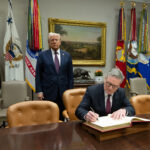In recent years, Chinese President Xi Jinping’s rhetoric concerning reunification with Taiwan has become more forceful and the timeline for it more specific, stating in 2013 and 2019 that the issue cannot be passed down from generation to generation. Likewise, Xi has overseen a remarkably swift modernization of China’s military, albeit not yet battle-tested. He hopes to overcome this disadvantage through technology, tasking China’s defense industry to produce weapons specifically tailored to repel US military involvement should China invade Taiwan.
On the other side of the Pacific, the US policy of strategic ambiguity is beginning to shift. Former President Donald Trump removed the ban on contact between senior leaders in the executive branch and their Taiwanese counterparts, expanded weapons sales to Taiwan, and increased military activity around the island. While leaving many of his predecessor’s policies intact, President Joe Biden has been more explicit about US intentions. On no fewer than three occasions, Biden has indicated that the United States will defend Taiwan. Most recently, the United States and Taiwan have begun negotiating bilateral trade agreements over strong objections from Beijing.
What does this all mean? Should we be getting ready for war?
POWER STRUGGLES
The Thucydides Trap, popularized by Graham Allison nearly a decade ago, is materializing faster than many have anticipated. China poses a direct threat to US global primacy and the international order that sits at its foundation. Most acutely, China is threatening the US military’s ability to operate in the South China Sea, which, in the long-term, threatens norms such as the primacy of state sovereignty over popular sovereignty, anti-free-market practices, and the disregard for human and individual rights.
As the prospect of war becomes increasingly plausible, Washington must ask itself, how many Americans is primacy worth?
To be sure, both sides have brought the world to this bridge but Washington needs to lead its crossing. Xi cannot simply walk away from Taiwan. Doing so, conceding to the West and accepting subordination in the East and South China Sea would erase Xi’s legitimacy in China. As the first leader since Mao to add political thought to the Communist Party’s constitution, Xi has wagered a great deal on his rein being historically significant. Oriana Skylar Mastro argues, Xi has made “unification with Taiwan to be part of his personal legacy.”
Likewise for Washington, allowing Taiwan to fall would mean conceding the end of its primacy. Evicting the world’s strongest navy would eliminate all doubt about China’s status as a peer nation.
Yet, the need to defend Taiwan is not immediately apparent outside the foreign policy blob. While many have focused on the island’s global share of semiconductor production, it also holds strategic military value. Access to Taiwan is necessary for Washington to credibly provide its regional security guarantees. For China militarily, controlling Taiwan would mean the ability to keep American surface ships outside the first island chain, limiting America’s ability to attack mainland China and protect its allies.
There is no fait accompli for either side during a Chinese invasion. As seen in Ukraine, a quantitatively superior military force with recent combat experience does not lend itself to a swift and definite victory. So why should we assume a completely untested military would be successful against a fortified island replete with American defense systems? If Washington decides to become involved militarily, the tables may tip in favor of a Taiwanese victory. It is likely that Tokyo, Canberra, and Seoul would also enter the war given they host US military personnel in their countries and therefore would be the final destination for some Chinese missiles.
THE COST OF PRIMACY
As the prospect of war becomes increasingly plausible, Washington must ask itself, how many Americans is primacy worth? And can the American public be convinced that defending Taiwan is worth the life of their youth? Is the prospect of being the second-largest economy or lacking dominant influence over South East Asia enough to rally the American people into another war against a country that did not attack them?
In the modern age, where Congress plays politics with veterans’ health, will Gen-Z, the current group of military-aged Americans, be willing to forgo their comfortable lives to defend and possibly die for Taiwan? The chances look slim. Currently, all branches of the US military are at decades-low recruitment levels. Only 23% of 17–24-year-olds are eligible for military service and according to an internal Defense Department survey, only 9% of those eligible had any propensity to do so. Many cite the fear of death, dismemberment, and psychological wounds. One can imagine that risking death or injury is made even more undesirable when it is in service of yet another unnecessary war.
Given this, a protracted war will require longer and more frequent deployments. Placing a heavy burden on forces that are already likely to face levels of casualties alien to the modern US military. Meanwhile, China’s bench is far deeper and its supply lines to Taiwan far shorter.
With Beijing not accepting the status quo, Washington has two choices left. One choice is to gradually walk back its commitment to Taiwan’s defense and its reliance on Taiwanese and other Southeast Asian products while fortifying defenses in Japan and the Philippines. But make clear to Taipei that US troops and fighter jets are not on their way. The other option is to stay the course and drastically build up US forces in the Indo-Pacific attempting to convince China that war would be too costly and victory for them too improbable.
Option one would be a tough pill to swallow for the self-declared back-to-back world war champions. It will require acknowledging that the US unipolar moment has passed and a radical change in the attitude of US policymakers and the public alike will be needed.
Option two requires maintaining an excessively dominant military posture while hoping China, much like the Soviet Union, implodes. Of course, this would occur while risking nuclear war and funneling resources needed at home to another war of choice.
It is not easy to admit that one squandered away the past three decades in the desert. But Washington will need to concede some territory to maintain the kingdom. After all, an effective strategy calls for aligning ends with means. The United States could walk away from a war still holding on to all of its chips, but it will undoubtedly suffer severe internal bleeding from which it may not recover.
Alex Thien is a US Navy veteran who served in the Persian Gulf. He is currently a Senior Consultant at a top firm in Washington DC Alex holds an MS in International Relations from Florida State University and BS in Global Studies from Arizona State University.




















